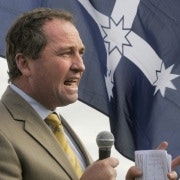False positives won't save Gillard
You may recall that just over a week ago, the "besieged" Julia Gillard was "thrown a lifeline" by Fairfax's Nielsen poll, which showed a big rise in Labor's vote and a fall in the Coalition's vote.
Well, at least according to Fairfax journalists.
There never was any "lifeline", in actuality. Labor's numbers were awful. And it had been two months since the previous Nielsen poll in early December. The "rise" in Labor's vote was meaningless given the length of time that separated the polls. That's not Nielsen's fault, or pollster John Stirton's fault, at all – it's Fairfax's, because it refuses to pay for a fortnightly poll. Christmas had also intervened, doubling the normal length of time.
Newspoll is fortnightly. Essential is weekly, with a fortnightly rolling average. Morgan is incessant. They can all provide a polling trend. It's a lot harder with Nielsen, particularly when the previous poll was two months and a holiday break ago.
Nonetheless, the "lifeline" idea took hold, despite its patent non-existence. Labor was said to be "buoyed".
That's what happens in political coverage. The truth is merely one narrative among many, and often only coincidentally linked to reportage, one not to be favoured over any other if it doesn't serve.
That's why yesterday I nicked Updike's metaphor to talk about how "investigation passes a threshold of commonsense and enters a sub-atomic realm where laws are mocked".
Ditto now with the revisitation of June 2010, courtesy of a fairly poor Four Corners story notable only for leaving commentators wondering why on earth Julia Gillard agreed to an interview – bearing in mind of course that politicians who don't agree to interviews are routinely berated.
But we're at the same stage as previous leaders reached before their demise, when even the most trivial things are attributed significance. Get confused over your Roves, or be upstaged by your opponent who speaks Mandarin, or comment on a junior reporter's outfit, and it dominates the media cycle, drowning out everything else. A politician needs clear air to communicate, and leaders die when the media cuts it off.
We're deep in the sub-atomic world here, carefully scrutinising evidence of what exactly Julia Gillard did, when speeches were prepared, when polling was waved in MPs' faces, all in the cause of explaining … what? That Gillard's ambitions and frustration with Kevin Rudd crystallised into action hours or days before she said it did? To what end? And who will ever know except Gillard herself?
The electorate is getting on with their lives, oblivious to this stuff. Julia Gillard's credibility is already shot as far as voters are concerned, and for altogether more substantial reasons that those currently obsessing sections of the press gallery. She's a "dead PM walking" as one Labor MP remarked yesterday, felled by her own lack of judgment, poor advice and an incapacity to prevent others – Tony Abbott, the media, and ultimately voters themselves – from constructing her prime ministerial persona for her.
That it's happening at the moment that her government secured passage of the private health insurance rebate means test, which has been on the agenda since the Rudd years (Mach I), is an example of the one of the few things the Gillard prime ministership has left in plentiful supply, irony. Gillard has been a master of getting legislation through, securing passage of key bills through the Senate when she was deputy while others tried and failed, then negotiating her way through a hung parliament with a deftness and judgment entirely at odds with that Sadim touch she displays outside the chamber.
She also rose in Parliament this morning to give an excellent speech in fulfilment of the government's annual Closing The Gap pledge, tying health, employment and education outcomes into the broader process and history of reconciliation, in so doing paying tribute to Kevin Rudd and John Howard. It was a speech that demonstrated what sort of leader Gillard occasionally showed she could have been, but now never will be … at least not this time around.
And when a new prime minister is installed, a new frontbench is revealed and various players take themselves off to the backbench or even out of parliament, once the dust has settled, the media will switch its focus to the future of the one politician in the country who, for all Gillard's faults, is even less popular than her – the bloke who sits opposite her at question time.
The tumbrel rolls ever on.
This story first appeared on www.crikey.com.au on February 15, 2012. Republished with permission.
















